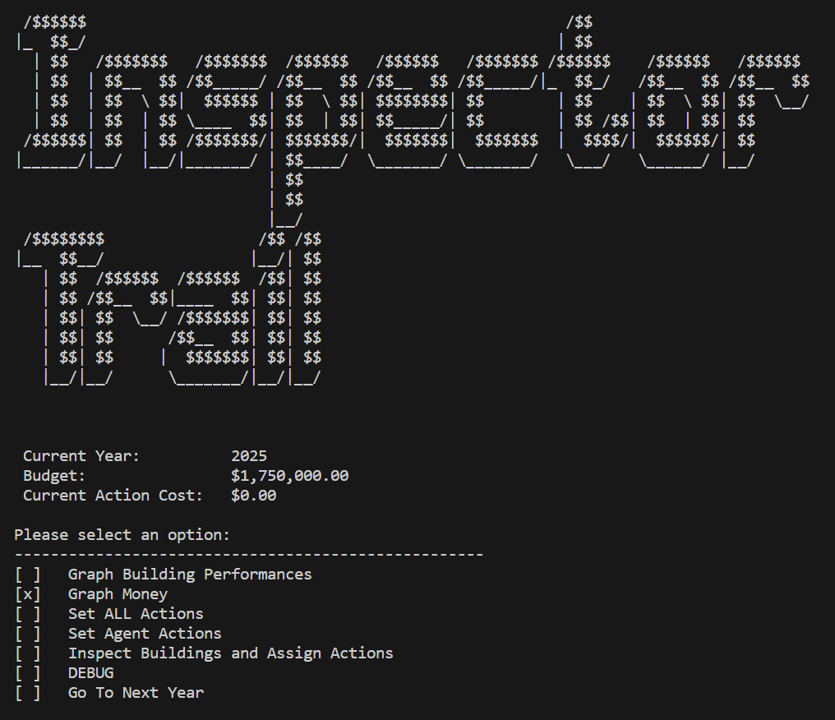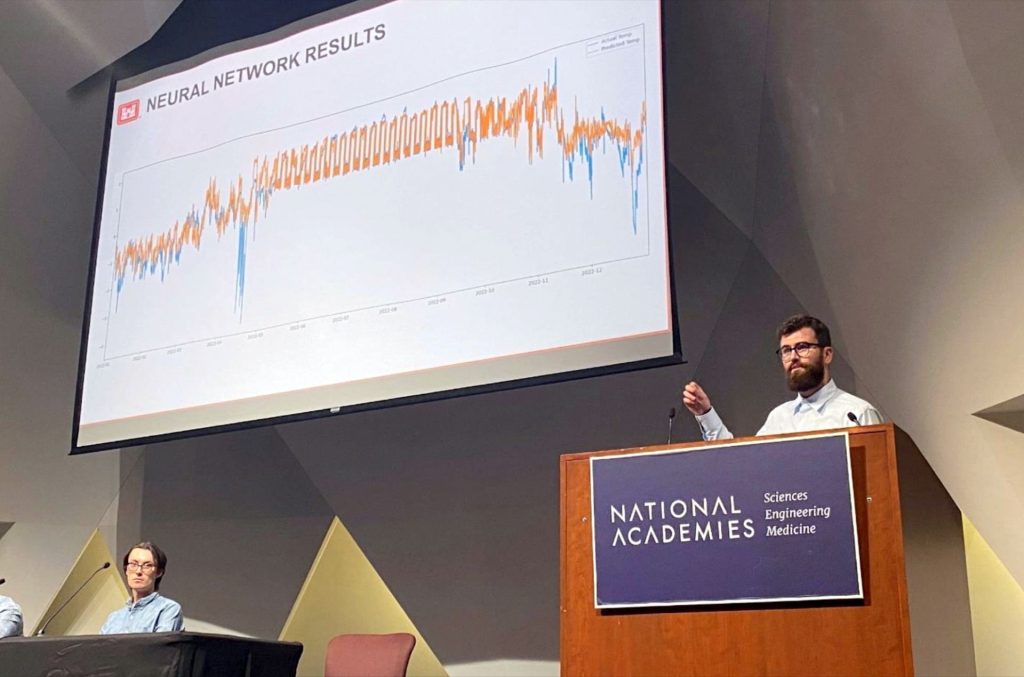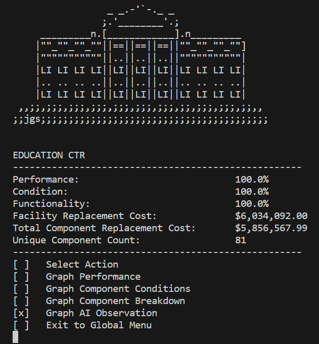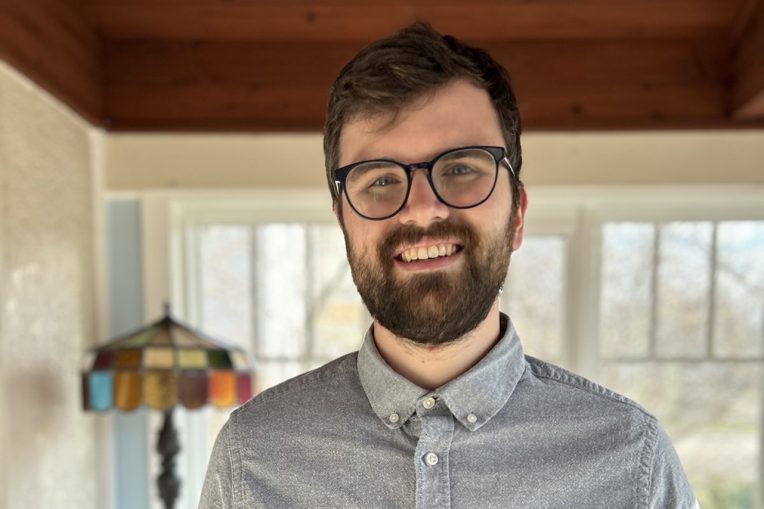Although nobody dies of dysentery in Joseph Wittrock’s Oregon Trail-inspired computer game Inspector Trail, the stakes remain high.
In Inspector Trail, Wittrock is training an artificial intelligence (AI) agent—the game’s “player”—to make data-informed maintenance recommendations for more than 200,000 U.S. Department of Defense (DoD) buildings across the globe. The real-world challenge facing the agent: how to most effectively invest taxpayer money in 2.2 billion square feet of DoD facilities.

“In the game, the agent is shown a bunch of data about components in a building and its inspection data, and it gets to choose a maintenance action: no maintenance, reduced maintenance, full maintenance, or complete modernization,” said Wittrock, a senior mathematics major at Illinois State University.
“To have the computer agent become really good at playing the game, the idea is, you now have a computer agent that can look at buildings and make good maintenance action recommendations.”
Wittrock developed Inspector Trail while working as an intern last summer for the U.S. Army Engineer Research and Development Center’s (ERDC) Construction Engineering Research Laboratory (CERL), which is charged with developing technologies to effectively and efficiently maintain DoD facilities. Wittrock was named CERL’s 2023 Research Assistant of the Year for his exceptional contributions.
“The thing that stood out about Joseph was his work ethic, his ingenuity, and his creativity to come up with Inspector Trail, a unique approach to solving this really large optimization problem,” said Matt Walters, CERL’s Sustainment Management System Technical Center of Expertise (SMS-TCX) chief.
“The core capability of Inspector Trail is a tool for what we’re trying to accomplish at CERL, and the byproduct is a creative way to demonstrate our process to somebody who’s not a data scientist. It’s a framework for launching into a more production-level capability in the future.”
Wittrock also contributed to a project exploring the use of building automation sensor data to provide real-time equipment diagnostics and metrics. The goal is to identify minor issues with building components before they become major problems.
“We want to use sensors and machine learning on these components, whether they’re detecting the voltage, temperature, or airflow—things like that—depending on the system,” Wittrock said. He presented his work on the main stage at the National Academies of Science Auditorium during the SMS Summit in Washington, D.C., last August.

Applying his abstract math skills to optimize DoD building maintenance was admittedly not on Wittrock’s radar until he met with two CERL representatives during last spring’s University Research Symposium. They were impressed by Wittrock’s project “Training a Physically Simulated Virtual Spider,” in which Wittrock and his research partner Dan Beyer trained a digital spider to complete various tasks using deep reinforcement learning.
“The idea is that we want to train an agent or a robot to do a task the same way we train a human—through a reward/penalty system,” said Dr. Mehdi Karimi, an assistant professor of mathematics at Illinois State who served as the project’s faculty mentor. “They did really good work, and it’s a very hot topic with a lot of applications, which is why this project stood out at the symposium.”

Shortly after the symposium, CERL hired Wittrock and classmate Bob Skudnig as summer interns. They joined students from Purdue University and Carnegie Mellon University on CERL’s engineering team. Walters said it’s the first time they’ve recruited math majors—but it won’t be the last.
“We were generally looking for engineering, computer science, or data analytics students,” Walters said. “But the work that they had both presented on stood out as something that was analogous enough that we could see the fit and were impressed by the work they had done. Now, mathematicians will be a part of our recruitment moving forward after seeing the capability and different ideas that they were able to bring to the table.”
An Education Partnership Agreement (EPA) between Illinois State and CERL signed in early 2023 has paved the way for more collaborative opportunities in the future.
Wittrock remains employed as a part-time intern with CERL while enrolled in Illinois State’s five-year accelerated sequence in mathematics program. He’ll earn a bachelor’s at the end of the semester and a master’s in spring 2025. As a math major, Wittrock is combining his many interests, ranging from architecture to astrophysics to video game design.
“At the root of it, what I really like about these things is the abstract math,” Wittrock said. “It’s just very applicable to all these different areas. There’s a lot you could do with it.”
Wittrock said his experience as a math major at Illinois State prepared him to excel in his internship. He’s also drawn from his involvement with the Game Development Club and the Association of Computing Machinery.
“There are a lot of fantastic opportunities all over the place at ISU,” Wittrock said. “And because ISU isn’t a massive school, I feel like it’s easier to get those opportunities.”
Although Wittrock hadn’t envisioned his mathematics journey leading to a potential career in facilities management with the U.S. Army, he feels like he’s on the right trail.
“It’s been a great experience at CERL,” Wittrock said. “It’s nice knowing that the work I’m doing is going toward this greater good of helping the nation as a whole. It’s very fulfilling.”

